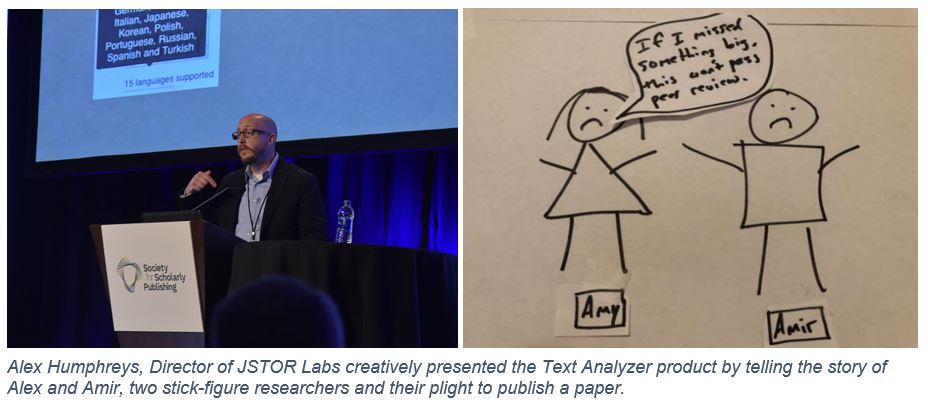June 20, 2018 – Wheat Ridge, CO – At the Society for Scholarly Publishing (SSP) 40th Annual Meeting held on May 30 – June 1, in Chicago, IL, JSTOR was awarded the first-ever People’s Choice Award for their Text Analyzer product during the SSP Previews Session, New and Noteworthy Product Presentations.
This “lightning-round” plenary offered the chance to learn more about the industry’s newest and most innovative products, platforms, and/or content in 5-minute, back-to-back presentations. Attendees left with exposure to a wide breadth of content on new and updated products of interest to the scholarly publishing community. After the 13 presentations, attendees were asked to vote via the meeting app for the product, platform, service, or content that would likely have the most positive impact in scholarly communications.

JSTOR’s Text Analyzer is a new way to conduct academic research created by JSTOR Labs, an innovation team building experimental tools for researchers and teachers. JSTOR Labs Director, Alex Humphreys demonstrated how Text Analyzer works by following the stories of Amy and Amir, two stick-figure researchers, in the light-hearted, lightning-round presentation. With Text Analyzer, researchers can search for content on JSTOR (a digital library with more than 2,000 academic journals and 50,000 books spanning hundreds of years) just by uploading a document. This can be anything: a manuscript, an outline of a work in progress, an article that has been downloaded, even a picture of a page of a textbook. Uploaded documents are not stored.
The tool analyzes the text within the document to determine what it’s about, and then uses the topics it deems most important — the “prioritized terms” — to find similar content in JSTOR.
The user can then review the results and download any articles they are interested in. The results can be refined by adding, removing or adjusting the importance of the prioritized terms.
Text Analyzer supports fifteen languages including: English, Arabic, (simplified) Chinese, Dutch, French, German, Hebrew, Italian, Japanese, Korean, Polish, Portuguese, Russian, Spanish and Turkish. Users uploading a document in, for example, Korean, will see relevant material in English. It’s compatible with mobile devices by using the device’s camera as a document scanner. There is also an API available to beta partners interested in programmatic access.
“We’re honored to have our Text Analyzer identified as the application most likely to have a positive impact on scholarly communications, especially out of such an impressive field of previews,” said Humphreys. “Our mission is to find ways to improve people’s access to knowledge and this includes the ways in which researchers can make productive use of the vast stores of digital content now available. We’re excited to have more people check out Text Analyzer and to keep building new tools that make a difference in their work.”
The SSP Previews Session has been a mainstay at the SSP Annual Meeting for a number of years. Originally it was a concurrent session but after several years of standing room only attendance, the session was offered as a plenary on Friday morning to allow for maximum attendance.
“The program committee decided to add an interactive voting element to the session this year to further engage the audience and create a bit of competition between the presenting organizations,” said Melanie Dolechek, SSP Executive Director.
JSTOR Labs received an engraved People’s Choice award in recognition of their product innovation.
“This year we received 45 submissions for the Previews Session. The committee selects the top 13-15 proposals to participate in the session at the meeting,” said David Myers, session organizer. “The selection process is based on four criteria, each rated on a five-point scale which ensures that only the most innovative and novel presentations are included.”
Other presenting organizations this year included: Atypon, Delta Think, The MIT Press, Association of American Medical Colleges, Quark Intelligent Systems Inc., Digital Science, Edanz Group, PaperHive, sci.AI, eLife & Hypothesis, Kudos, and Copyright Clearance Center.
About the Society for Scholarly Publishing – SSP, founded in 1978, is a nonprofit organization formed to promote and advance communication among all sectors of the scholarly publication community through networking, information dissemination, and facilitation of new developments in the field. SSP members represent all aspects of scholarly publishing—including publishers, printers, e-products developers, technical service providers, librarians, and editors. SSP members come from a wide range of large and small commercial and nonprofit organizations. They meet at SSP’s annual meetings, educational seminars, and focus groups to hear the latest trends from respected colleagues and to discuss common and mutual (and sometimes divergent) goals and viewpoints.
For more information, contact:
Melanie Dolechek, Executive Director
info@sspnet.org | 303 422 3914


Join the Conversation
You must be logged in to post a comment.